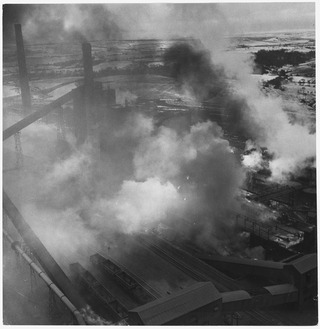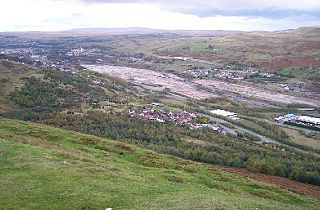Sources
- Whitaker's Almanack (various dates)
The Lancashire Steel Corporation Ltd was a United Kingdom steel producer. The company was formed in 1930 by amalgamating the iron and steel interests of the Pearson & Knowles Coal & Iron Co, the Partington Steel & Iron Co, and the Wigan Coal & Iron Co. The company was nationalised in 1951, becoming part of the Iron and Steel Corporation of Great Britain, but de-nationalised shortly afterwards. It was renationalised in 1967, becoming part of the British Steel Corporation. [1]

British Steel was a major British steel producer. It originated from the nationalised British Steel Corporation (BSC), formed in 1967, which was privatised as a public limited company, British Steel plc, in 1988. It was once a constituent of the FTSE 100 Index. The company merged with Koninklijke Hoogovens to form Corus Group in 1999.
GKN Ltd is a British multinational automotive and aerospace components business headquartered in Redditch, England. It was a long-running business known for many decades as Guest, Keen and Nettlefolds. It can trace its origins back to 1759 and the birth of the Industrial Revolution. In 2018 GKN plc was acquired by Melrose Industries plc in a hostile takeover. Melrose divested GKN Automotive and GKN Powder Metallurgy in 2023 and listed them as Dowlais Group on the London Stock Exchange. GKN Aerospace continues to be owned by Melrose plc.

Dorman Long & Co was a UK steel producer, later diversifying into bridge building. The company was once listed on the London Stock Exchange.
The United Steel Companies was a steelmaking, engineering, coal mining and coal by-product group based in South Yorkshire and Lincolnshire, England.
Tinsley Park Collieries were a group of coal mines situated in the Tinsley / Darnall area to the east of the City of Sheffield, South Yorkshire, England.
The Lancashire Electric Power Company was one of the largest private electricity companies in the UK. It was established in 1900 and generated and supplied electricity to 1,200 squares miles of Lancashire from 1905 until its abolition under nationalisation in 1948.

The Staveley Coal and Iron Company Limited was an industrial company based in Staveley, near Chesterfield, north Derbyshire.
The Iron and Steel Corporation of Great Britain was a nationalised industry, set up in 1949 by Clement Attlee's Labour government.
Richard Thomas and Baldwins Ltd (RTB) was a major iron, steel and tinplate producer, primarily based in Wales and formed in 1948 by the merger of Richard Thomas & Co Ltd with Baldwins Ltd. It was absorbed into British Steel Corporation in 1967. The business now forms part of Tata Steel Europe.
The Steel Company of Wales Ltd was a Welsh steel and tinplate producer. It was formed in 1947 and absorbed into British Steel Corporation in 1967, British Steel then merged with Hoogovens and became Corus UK Limited. The business now forms part of Tata Steel Europe.
The English Steel Corporation Ltd was a United Kingdom steel producer. The company was jointly owned by Cammell Laird and Vickers and was formed to bring together their basic steel making interests, principally in the Sheffield area but also including a plant in Openshaw, Manchester.

The Consett Iron Company Ltd was an industrial business based in the Consett area of County Durham in the United Kingdom. The company owned coal mines and limestone quarries, and manufactured iron and steel. It was registered on 4 April 1864 as successor to the Derwent & Consett Iron Company Ltd. This in turn was the successor to the Derwent Iron Company, founded in 1840.

John Summers & Sons Ltd was a major United Kingdom iron and steel producer, latterly based on the Dee Estuary at Shotton, Flintshire. The company was absorbed into British Steel Corporation in 1967; British Steel became Corus in 1999 and this company was taken over by Tata Steel in 2007.

The Ravenscraig steelworks, operated by Colvilles and from 1967 by British Steel Corporation, consisted of an integrated iron and steel works and a hot strip steel mill. They were located in Motherwell, North Lanarkshire, Scotland.

The Coal Industry Nationalisation Act 1946 was an Act of the Parliament of the United Kingdom which nationalised, or brought into state control, the coal industry in the United Kingdom. It established the National Coal Board as the managing authority for coal mining and coal processing activities. It also initially provided for the establishment of consumers' councils. The Coal Industry Nationalisation Act 1946 was the first of a number of Acts promulgated by the post-war Labour government to nationalise elements of the UK's industrial infrastructure; other Acts include the Electricity Act 1947; the Transport Act 1947 ; the Gas Act 1948; and the Iron and Steel Act 1949.

Chisnall Hall Colliery was a coal mine in Coppull in Lancashire, England. It was the largest coal mine on the Lancashire Coalfield north of Wigan. The colliery on Coppull Moor was owned by Pearson and Knowles Coal and Iron Company in 1896 when it employed 135 underground and 48 surface workers. The colliery appeared on maps in 1908 as a coal mine with two shafts and railway sidings connecting its 1.5-mile mineral railway to the London and North Western Railway's West Coast Main Line. In 1930, Pearson & Knowles merged with the Wigan Coal and Iron Company and others and their collieries became the property of the Wigan Coal Corporation. More than 1,000 people were employed there in 1933 and more than 300,000 tonnes of coal were produced annually.

Ebbw Vale Steelworks was an integrated steel mill located in Ebbw Vale, South Wales. Developed from 1790, by the late 1930s it had become the largest steel mill in Europe. It was nationalised after World War II. As the steel industry changed to bulk handling, iron and steel making was ceased in the 1970s, and the site was redeveloped as a specialised tinplate works. It was closed by Corus in 2002, but is being redeveloped in a joint partnership between Blaenau Gwent Council and the Welsh Government.
The Wigan Coal and Iron Company was formed when collieries on the Lancashire Coalfield owned by John Lancaster were acquired by Lord Lindsay, the Earl of Crawford and Balcarres, owner of the Haigh Colliery in 1865. The company owned collieries in Haigh, Aspull, Standish, Westhoughton, Blackrod, Westleigh and St Helens and large furnaces and iron-works near Wigan and the Manton Colliery in Nottinghamshire.
The Lilleshall Company was a large engineering company in Oakengates Shropshire founded in 1802. Its operations included mechanical engineering, coal mining, iron and steel making and brickworks. The company was noted for its winding, pumping and blast engines, and operated a private railway network. It also constructed railway locomotives from 1862 to 1888.

The Iron and Steel Act 1949 was an act of the Parliament of the United Kingdom which nationalised, or bought into state control, elements of the iron and steel industry in Great Britain. It established an Iron and Steel Corporation which acquired certain iron and steel companies. In a departure from earlier nationalisations the Corporation only acquired the share capital of the companies, not the undertakings themselves. The individual companies continued to operate under management Boards appointed by the corporation. The Iron and Steel Act 1949 was one of a number of acts promulgated by the post-war Labour government to nationalise elements of the UK's industrial infrastructure; other acts include the Coal Industry Nationalisation Act 1946; the Electricity Act 1947; Transport Act 1947 ; and the Gas Act 1948.